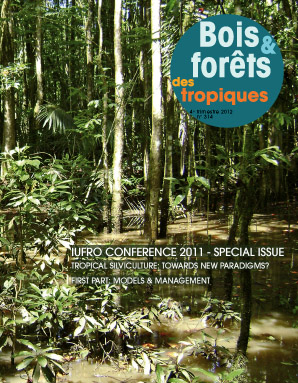Aboveground biomass, wood volume, nutrient stocks and leaf litter in novel forests compared to native forests and tree plantations in Puerto Rico
DOI:
https://doi.org/10.19182/bft2012.314.a20493Keywords
novel forest, plantings, leaf litter, aboveground biomass, nutrients, Caribbean forestsAbstract
The article presents comparative data for aboveground biomass, wood volume, nutrient stocks (N, P, K) and leaf litter in different types of forests in Puerto Rico. The aim of the study is to assess how novel forests of Castilla elastic, Panama Rubber Tree, and Spathodea campanulata, African Tulip Tree, compare with tree plantations and native historical forests (both secondary and mature). It found that novel forests of these two species can accumulate large quantities of biomass and nutrients above ground that they do so at a rapid rate and that they exhibit high rates of leaf fall. They can match or exceed tree plantations and native forests in all parameters except the accumulation of nitrogen above ground. These results support the notion that novel forests can contribute to the restoration of biomass and nutrient stocks in previously deforested sites. However, across the island as a whole, the values for biomass in many types of novel forest are lower than those observed for Spathodea and Castilla in this study. The age of stands and site conditions appear to be critical to the level of nutrient and biomass accumulation in these forests.
Downloads
References
ABELLEIRA-MARTÍNEZ O. J., 2010. Invasion by native tree species prevents biotic homogenization in novel forests of Puerto Rico. Plant Ecology, 211: 49-64.
ABELLEIRA MARTÍNEZ O. J., 2011. Flooding and profuse flowering result in high litterfall in novel Spathodea campanulata forests in northern Puerto Rico. Ecosphere, 2: 105. doi:110.1890/ES1811-00165.00161.
ABELLEIRA MARTÍNEZ O., LUGO A. E., 2008. Post sugar cane
succession in moist alluvial sites in Puerto Rico. In: R. W. Myster, editor. Post-agricultural succession in the Neotropics. Springer, New York, p. 73-92.
ABELLEIRA-MARTÍNEZ O. J., RODRÍGUEZ M. A., ROSARIO I.,
SOTO N., LÓPEZ A., LUGO A. E., 2010. Structure and species composition of novel forests dominated by an introduced species in north-central Puerto Rico. New Forests, 39: 1-18.
BRANDEIS T. J., SUÁREZ ROZO M. D. R., 2005. Effects of
model choice and forest structure on inventory-based estimations of Puerto Rican forest biomass. Caribbean Journal of Science, 41: 250-268.
BROWN S., LUGO A. E., 1982. The storage and production of organic matter in tropical forests and their role in the global carbon cycle. Biotropica, 14: 161-187.
BROWN S., LUGO A. E., 1990. Tropical secondary forests. Journal of Tropical Ecology, 6: 1-32.
FRANGI J. L., LUGO A. E., 1985. Ecosystem dynamics of a subtropical floodplain forest. Ecological Monographs, 55: 351-369.
FRANGI J. L., LUGO A. E., 1998. A flood plain palm forest in the Luquillo Mountains of Puerto Rico five years after Hurricane Hugo. Biotropica, 30: 339-348.
FONSECA DA SILVA J., 2011. Ecophysiology and productivity of Castilla elastica, an introduced tropical tree species. Masters, University of Puerto Rico, Río Piedras, Puerto Rico.
HOBBS R. J., HIGGS E. S., HALL C. (EDS.), 2012. Novel
Ecosystems: Intervening in the new ecological world order? Wiley, Oxford, In press.
LUGO A. E., 1992. Comparison of tropical tree plantations with secondary forests of similar age. Ecological Monographs, 62: 1-41.
LUGO A. E., 2004. The outcome of alien tree invasions in Puerto Rico. Frontiers in Ecology and the Environment, 2: 265-273.
LUGO A. E., 2009. The emerging era of novel tropical forests. Biotropica, 41: 589-591.
LUGO A. E., ABELLEIRA O. J., COLLADO A., VIERA C. A., SANTIAGO C., VÉLEZ D. O., SOTO E., AMARO G., CHARÓN G., COLÓN JR. H., SANTANA J., MORALES J. I., RIVERA K., ORTÍZ L., RIVERA L., MALDONADO M., RIVERA N., VÁZQUEZ N. J.,
a. Allometry, biomass, and chemical content of novel African tulip tree (Spathodea campanulata) forests in Puerto Rico. New Forests, 42: 267-283.
LUGO A. E., DOMÍNGUEZ CRISTÓBAL C., MÉNDEZ N., 2011b.
Hurricane Georges accelerated litterfall fluxes of a 26-yr-old novel secondary forest in Puerto Rico. In: Recent hurricane research: climate, dynamics, and societal impacts, A. R. Lupo (Ed.)., InTech, Rijeka, Croatia, p. 535-554.
LUGO A. E., FIGUEROA J., 1985. Performance of Anthocephalus chinensis in Puerto Rico. Canadian Journal of Forest Research, 15: 577-585.
LUGO A. E., HELMER E., 2004. Emerging forests on abandoned land: Puerto Rico’s new forests. Forest Ecology and Management, 190: 145-161.
LUGO A. E., MURPHY P. G., 1986. Nutrient dynamics of a Puerto Rican subtropical dry forest. Journal of Tropical Ecology, 2: 55-76.
LUGO A. E., SILVER W. L., MOLINA COLÓN S., 2004. Biomass
and nutrient dynamics of restored neotropical forests. Water, Air and Soil Pollution: Focus, 4: 731-764.
SCATENA F. N., LUGO A. E., 1995. Geomorphology, disturbance, and the soil and vegetation of two subtropical wet steepland watersheds of Puerto Rico. Geomorphology, 13: 199-213.
SILVER W. L., SCATENA F. N., JOHNSON A. H., SICCAMA T. G.,
SÁNCHEZ M. J., 1994. Nutrient availability in a montane wet tropical forest in Puerto Rico: spatial patterns and methodological considerations. Plant and Soil 164: 129-145.
VIERA MARTÍNEZ C. A., ABELLEIRA MARTÍNEZ O., LUGO A. E.,
Estructura y química del suelo en un bosque de Castilla elastica en el carso del norte de Puerto Rico: resultados de una calicata. Acta Científica, 22: 29-36.
VITOUSEK P. M., 1982. Nutrient cycling and nutrient use efficiency. American Naturalist, 119: 553-572.
VITOUSEK P. M., 1984. Litterfall, nutrient cycling, and nutrient limitation in tropical forests. Ecology, 65: 285-298.
Downloads
Issue
Section
-
Abstract249
-
PDF (Français)237
Published
How to Cite
License
 All articles are published in Open Access. They are governed by Author's rights and by the creative commons licenses. The license used is Attribution (CC BY 4.0).
All articles are published in Open Access. They are governed by Author's rights and by the creative commons licenses. The license used is Attribution (CC BY 4.0).










